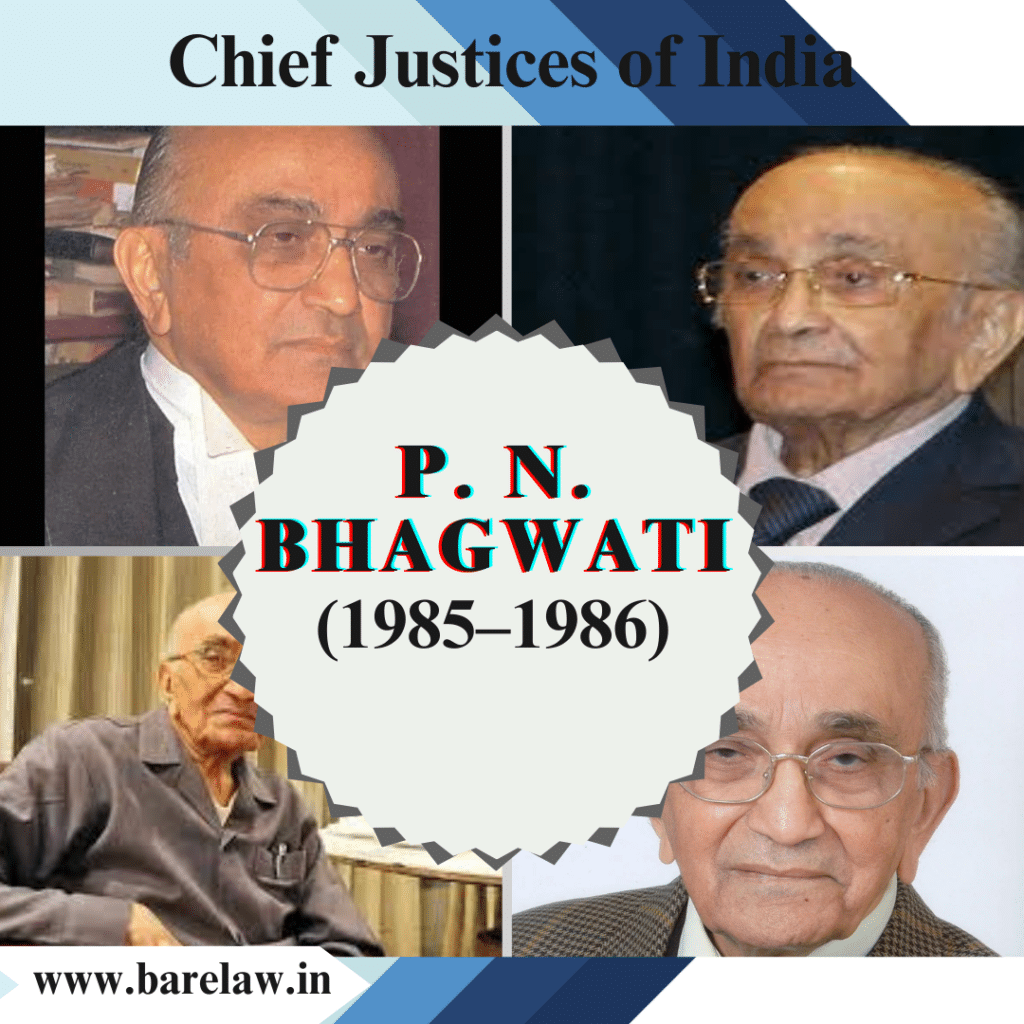
Table of Contents
P. N. Bhagwati: A Transformational Chief Justice
P. N. Bhagwati: A Transformational Chief Justice
The office of the Chief Justice of India carries with it immense responsibility and influence, shaping the course of justice and jurisprudence in the nation. In the annals of Indian legal history, the tenure of Justice Prafullachandra Natwarlal Bhagwati as the Chief Justice of India from 1985 to 1986 stands out as a transformative period. This article delves into the life, legacy, and impact of Chief Justice P. N. Bhagwati, who left an indelible mark on the Indian judiciary and legal landscape.
Early Life and Career:
P. N. Bhagwati was born on December 21, 1921, in Gujarat, India. He came from a distinguished family with a strong legal tradition, and his father, N. H. Bhagwati, was a renowned advocate. Following in his father’s footsteps, Bhagwati pursued law and graduated with honors from the Government Law College, Mumbai.
Bhagwati’s legal career began in the chambers of his father, where he imbibed the principles of justice and the importance of upholding the rule of law. His commitment to the legal profession and his sharp intellect soon propelled him into the spotlight, and he was appointed as a judge of the Gujarat High Court in 1960.
Notable Judicial Achievements:
- Right to Legal Aid: One of the hallmark achievements during Bhagwati’s tenure as Chief Justice of India was his instrumental role in expanding the right to legal aid. He believed that access to justice should be available to all, regardless of their socio-economic background. Under his leadership, the Supreme Court handed down the historic judgment in Hussainara Khatoon v. Home Secretary, Bihar, which recognized the right of indigent prisoners to free legal aid.
- Public Interest Litigation (PIL): Justice Bhagwati played a pioneering role in shaping the concept of Public Interest Litigation in India. He believed that the judiciary had a duty not only to resolve individual disputes but also to safeguard the interests of the marginalized and vulnerable sections of society. This approach revolutionized Indian jurisprudence, allowing citizens to approach the court as ‘public-spirited individuals’ to seek justice on behalf of others.
- Environmental Protection: Chief Justice Bhagwati’s tenure coincided with growing concerns about environmental degradation. His court recognized the need to protect the environment and passed several landmark judgments, such as the M.C. Mehta v. Union of India case, which led to the closure of hazardous industries operating near the Taj Mahal.
- Expanding the Horizon of Human Rights: Justice Bhagwati was a fervent advocate for human rights. His tenure saw the Indian judiciary actively engage with international human rights norms. He was instrumental in India’s ratification of the International Covenant on Civil and Political Rights (ICCPR), signaling the country’s commitment to global human rights standards.
- Economic and Social Rights: Bhagwati’s court expanded the interpretation of fundamental rights to include economic and social rights. In cases like Chameli Singh v. State of U.P., the court held that the right to life under Article 21 encompassed the right to live with dignity, ensuring access to basic amenities like food, shelter, and healthcare.
Critiques and Controversies:
While Chief Justice P. N. Bhagwati’s tenure was marked by pioneering legal reforms and a commitment to justice, it was not without controversies. His support for the imposition of preventive detention during the Emergency in the mid-1970s and his role in certain cases, such as the ADM Jabalpur v. Shivkant Shukla, have drawn criticism from legal scholars and human rights activists. These instances raised questions about the judiciary’s independence during times of political turmoil.
Additionally, some legal experts argue that the expansion of PILs, while a powerful tool for social justice, also led to the proliferation of frivolous litigation and the clogging of court dockets.
Legacy and Influence:
Chief Justice P. N. Bhagwati’s legacy remains a subject of robust debate among legal scholars and the broader public. He is celebrated for his commitment to human rights, legal aid, and access to justice, but his tenure is also a reminder of the complex interplay between judicial decisions and political dynamics.
His impact on the legal landscape is undeniable. The recognition of PILs as a vital instrument for social justice, the protection of environmental rights, and the broader interpretation of fundamental rights are enduring contributions to Indian jurisprudence. His ideas continue to influence and shape the discourse on legal and human rights issues in India.
Conclusion:
As the legal community reflects on his legacy, it is evident that Chief Justice P. N. Bhagwati’s vision of a just and equitable society, where the law serves as a shield for the vulnerable and marginalized, remains a guiding principle for the Indian judiciary and a source of inspiration for future generations of legal practitioners and jurists.
The tenure of Chief Justice P. N. Bhagwati was a transformative period in the history of the Indian judiciary. His commitment to justice, human rights, and the rule of law left an indelible mark on the legal landscape. While his legacy is not without its controversies and critiques, his contributions to expanding access to justice, safeguarding human rights, and promoting public interest litigation continue to resonate in Indian jurisprudence.





